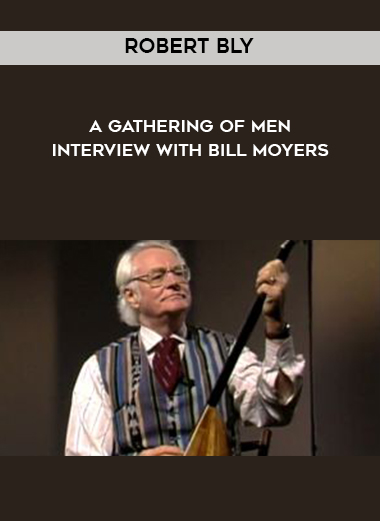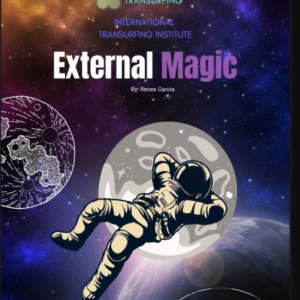Robert Bly – A Gathering of Men – Interview with Bill Moyers
ROBERT BLY – A GATHERING OF MEN – INTERVIEW WITH BILL MOYERS
ROBERT BLY, Poet: [at gathering] We are leaving our time now. We are leaving our time now. There are places where time moves more slowly than here. We all know all four directions, east, west, north, south. And we are also under the fifth direction, the vertical one, which is in us today, here.
Once upon a time, there was a king and a queen. And they lived in a castle. And near the castle there was a forest. You know there’s always a forest near the castle. And this forest was like other forests, with one exception: when anyone went into it, he didn’t come back. Five hunters went out, and they didn’t come back. Ten hunters were sent after them, and they didn’t come back. Then twenty hunters went out, they did not come back. And then thirty hunters were sent after them, and they did not come back.
And pretty soon, no one went to that part of the forest anymore. Only occasionally a hawk or an eagle flew over it. That identifies this as a male story, the hawk and the eagle are male birds. That was the situation, and that’s the way it lasted for many years.
Finally, one day a young man came, and he said, “Anything dangerous to do around here?” And the king said, “Yes, there is, but I don’t recommend it, because the return rate is not good.” And the young man said, “That’s the sort of thing I like, I think I’ll go.”
So he went, taking only his dog with him. Maybe the fact that he didn’t go in a group was a part of it. He took only his dog with him, and he walked into the forest and he walked all the way into the forest and all of a sudden, a hand came up out of the pond and pulled the dog down. And he didn’t get hysterical. He just said, “This must be the place.”
BILL MOYERS: I’m Bill Moyers. The title of this program is “A Gathering of Men,” but women are invited, too. What we are exploring is the confusion many men feel today about their roles in society and their inner lives as well. Women have a stake in how men address these issues, of course, just as men have been affected over the years by the feminist movement.
It’s not accurate to describe what’s happening as a men’s movement, as such, but gatherings like this one in Austin, Texas, are taking place more and more frequently, and they’re drawing larger and larger numbers of men. What summons these men, in my experience, is not a desire to separate again from women, or to move back to that destructive, aggressive and dominating masculine personality of more chauvinistic days.
To the contrary. Men are drawn to these retreats by a sense of loss, a loss of familiar myths and road maps, but also by a sense of hope. There is something optimistic about the very willingness of men to learn from one another through sharing their confusion over the problems of life.
For many of these men there is also the chance to share in the hard won wisdom of Robert Bly.
[voiceover] Robert Bly is arguably the most influential American poet living today, whether writing about Silence in the Snow Fields or The Light Around the Body, about the war in Vietnam or the archaeology of private memory, he confers upon even the simplest words a weight and consequence of new things.
Born on the Minnesota prairie of Norwegian Lutheran stock, Bly first attended a one room school, then the University of Iowa and Harvard. But the experience of his own life and the poems, myths and fairy tales of the world have been his most constant teachers. His own poems are woven from the realities of pain and hope, tribulation and joy. He won the National Book Award for poetry in 1968, and has since published a growing collection of poems and translations that express what one critic calls, “a deep marriage between the inner and outer worlds in one man’s life.”
His clear, strong images of masculine consciousness and the honesty of his own autobiography have made Robert Bly a father figure at gatherings of men all over the country. He’s now writing a book on masculinity, and one of its themes is the grief and loss men often feel, but seldom acknowledge.
BLY: [at gathering] I’ll begin with a poem by Antonio Machado, the Spanish poet. There’s a lot of pain and grief around men these days, and he touches on it here.
The wind one brilliant day called to my soul with an odor of jasmine.
The wind said, “In return for the odor of my jasmine, I’d like all the odor of your roses. ”
[Machado said,] “I have no roses; all the flowers in my garden are dead … ”
The wind said, “Then, I’ll take the withered petals, and the yellow leaves, ”
and the wind left. And I wept. And I said to myself, “What have you done with the garden that was entrusted to you?”
Good poem, hmm? I think this feeling of the garden being blown apart doesn’t happen much to you until you’re 35 or so. The models we were given as men in high school, well, what were they Eisenhower, John Wayne? They only last till you’re maybe 32 or 33. And then you notice that something’s gone wrong in your business, in your private life, in your relationships; these things don’t last. And so around 35, you have to find another image for what a man is, or what your man is. Is that clear, that idea?
So it takes a little bit of courage to come here. There’s lots of men who feel this, and then they won’t act on it. Or those in their 20s say: “I’m doing fine, Jack, I’m fine. It’s true that 14 women have left me, and two beat me up, but I’m doing fine. It’s true I’m bleeding from all my pores, but I’m fine.”
MOYERS: Why “A Gathering of Men?” I mean, that’s really rare, isn’t it, to have a workshop for men only?
BLY: Maybe 20 years ago it would have been rare, but lately the men in various parts of the country have begun to gather. I think that it isn’t a reaction to the women’s movement, really. I think the grief that leads to the men’s movement began maybe 140 years ago, when the Industrial Revolution began, which sends the father out of the house to work.
MOYERS: What impact did that have?
BLY: Well, we receive something from our father by standing close to him.
MOYERS: Physically.
BLY: When we stand physically close to our father, something moves over that can’t be described in material terms, that gives the son a certain confidence, an awareness, a knowledge of what it is to be male, what a man is. And in the ancient times you were always with your father; he taught you how to do things, he taught you how to farm, he taught you whatever it is that he did. You learned from him. But you had this sense of being of receiving a food from him.
MOYERS: Food.
BLY: A food. From your father’s body. Now, when the father went out of the house in the Industrial Revolution, that food ended, and I think the average American father now spends ten minutes a day with a son — I think that’s what The Minneapolis Tribune had — and half of that time is spent in, “Clean up your room!” You know, that’s a favorite phrase of mine, I know it well.
So the Industrial Revolution did not harm the mother and daughter relationship as much as it did the father and son, because the mother and daughter still stand close to each other and have stood close to each other. Maybe that’ll change now when the mother is being sent out to work also, but the daughters then receive some knowledge of what it is to be a woman, or if you prefer to call it the women’s the female mode of feeling. They receive knowledge of the female mode of feeling. And the mother gets that from her grandmother, who got it from her great grandmother, who gets it from her great grandmother, it goes all the way down.
After the Industrial Revolution, the male does not receive any knowledge from his father of what the male mode of feeling is, and the old male initiators that used to work are not working anymore.
MOYERS: What do you mean, male initiators?
BLY: Well, the you know, in the traditional times, you were not initiated by your father, because there’s too much tension between you and your father. You are initiated by older, unrelated males, is the word that’s used, older unrelated men. They may be friends of your father. They could even be uncles or grandfathers. But they are the ones who used to do it. Then they disappear. Then it falls on the father to do. Then the father is off at the office. You see the picture?
MOYERS: Yeah. In fact, in some of the traditional cultures, a night arrives, and a group of men show up at a boy’s house, and they take him away from the home and they don’t bring him back, then, for several days. And then when he comes back, he has ashes on his face.
BLY: Yeah. In New Guinea, where they still do it today, the men come in with spears to get the boys. The boys know nothing about the men’s world. They live with their mother completely. They say, you know, “Mama, Mama, save us from these men that are coming here.” Now, all over New Guinea, the women accept and the men accept one thing. A boy cannot be made into a man without the active intervention of the older men.
Now, when they all accept that, then the women’s job is to be participants in this drama. So the men come and take the boys away, and the boys are saying, “Save me, Mommy,” you know. Then they go across, and the men have built a tent on this island they have a built a house for the boys’ initiation hut. Then they take them across the bridge, and three or four of the women, whose boys these are, get their spears and meet them on the bridge. And the old men have their spears. And the boys are saying, “Save me, Mama, save me, these are horrible men, they’re taking me away,” you know, and they fight and everything. And then the women are driven back. Then the women all go back and have coffee and say, “How’d I do? How’d I look?”
So that wonderful participation in it, the women are not doing the initiating, they’re participating, and then, as you said, then he’ll stay with the men for a year, maybe. Then they will explain to him something has to die to be born, and what will have to die is the boy. This is what isn’t happening to the men in this culture.
BLY: [at gathering] I was giving a reading in Minnesota, in my little town, this year, and I gave “Rapunzel,” and the cutting off of the golden hair of Rapunzel, and I said to the audience, “How many of you do you remember when you had your golden hair cut off?” And then later a young man came up to me at the party afterwards, and he said: “I didn’t dare say anything at that time, but this is what happened to me. I was about 15, and my parents wanted my long hair off. And I refused to cut it off. One day they got me and they tied me down, and they cut it off. I started to beat the ground, and I was weeping and hitting the floor. And while I had stopped hitting the floor and was still weeping, my grandfather walked in, and he saw immediately what had happened.” I said, “What did your grandfather do?” They lived in Long Island. He took the boy out to the ocean and he said to the boy, “You see this ocean? Now, this is for you. This ocean is going to be here whether you have long hair or short hair.”
That only the grandfather could say that. And then that man said to me, “You know, he was right?” He said: “I went away, six years later I came back, I looked at the ocean, wham! It was incredible, like my grandfather had given it to me.”
I said, “Unbelievable, unbelievable.” That’s the kind of thing that the older men do, that your father can’t do.”
BLY: My father was an alcoholic, and he didn’t teach me much about the male mode of feeling. But he taught me something. But many men have no father at all, or the father left when they were two, or the father doesn’t say anything, or the father doesn’t talk well about feelings natural, it seems to be natural in the American male, it comes from the frontier, apparently.
So then, how does he learn the male mode of feeling? He doesn’t. And in the ’60s, it came to a crisis, I think.
MOYERS: Vietnam?
BLY: Yes. You know, in the Vietnam War, it was as if many of the women offered to initiate the young men. The young men hadn’t been helped by their fathers, and they really were betrayed by the older men in the time of Vietnam. And so the women would offer to initiate them, in wonderful things like respect for the earth, respect for life, respect for feeling and so on. That wasn’t wrong at all, it was just that no one has helped them with the male mode of feeling.
MOYERS: What’s the chief difference, as you see it, between male feeling and female feeling?
BLY: A strong part of the women’s mode of feeling has to do with pain. Moving towards pain and help removing it, and also the pain of being devalued. I mean, women’s values have been rejected in this culture for 2,000 years or more, and women feel a strong pain in this devaluation. Men don’t feel devalued quite that much. With the men it’s more an area of grief, as opposed to pain. And
MOYERS: You keep using that word, grief, in regard to men.
BLY: Yeah. You see, in my own case, I began as a poet, writing poetry, and poetry deals with feeling, but I felt that until I felt that grief is a door to male feeling. Until I had really tried to go into some of the grief around my father, I didn’t feel that I had access to the feeling.
MOYERS: Tell me about that.
BLY: Well, you know, as men we’re taught not to not to feel pain and grief, as children. I remember seeing one of my boys, he was maybe about nine. He was hit in a basketball [game], maybe hit by the ball, and I saw him turn around and bend down and get control of his pain and his grief before he stood up again. That same boy would be so wonderful in being open to wounds and crying and so on when he was very small. But, you know, the culture had said to him, “You cannot give way to that, you must turn around and when you must turn around; you must have a face without pain or grief in it,” right?
So therefore, as a son of an alcoholic, I received that. I mean, when you’re in an alcoholic family, you’re hired to be cheerful. That’s one of your jobs. You’re appointed that way. One is hired to be a trickster, another I was hired to be cheerful, so that when anyone asked me about the family. I’d have to lie in a cheerful way and say, “Oh, it’s wonderful, yes, indeed, we have sheep, you know, and we have chickens, and everything’s wonderful.”
Well, then if you can deny something so fundamental as the deep grief in the whole family, you can deny anything. So then how can you write poetry, then, if you’re involved in that much denial? So the word denial was very helpful to me.
MOYERS: Did you resent your father? Did you feel
BLY: No, I think that what happened was that as far as the grief goes, being appointed to be the cheerful one in the family, I would tend to follow a movement upward like this, hmm? More and more achievement, more and more and so on, hmm? That’s what you’d do. And finally you’d redeem the family’s name by doing this.
Well, I got to be about 46 or so, and then I realized how unsteady I was, and how my own poems didn’t have well, I didn’t even mention my father in my poems until I was 46. Not once. So I’d look at my poems they’re good poems but there’s something missing in there. And then I began to realize that in the ancient times, the movement for the man was downward, a descent into grief, Before you’re really a man that descent has to take place. It’s referred to in the fairy tales as the time of ashes and the time of descent.
So I wrote a poem at that time, and it’s the first poem — I must have been 46 or 47 — it is the first poem I had written in which there was some sort of grief. I’ll read it to you. Want to hear it?
MOYERS: Mm hmm.
BLY: It’s called Snowbanks North of the House. Maybe you know the poem. Snowbanks snow comes down from Alaska, you know, and then stops suddenly. And I’d noticed that little place there where something stops and doesn’t go further. So I wrote this line:
Those great sweeps of snow that stop suddenly, six feet from the house …
I left it in the drawer for two or three months, to see what would happen, and finally the rest of the poem came.
Those great sweeps of snow that stop suddenly six feet from the house …
Thoughts that go so far.
The boy gets out of high school and reads 110 more books; the son stops calling home. The mother puts down her rolling pill, and makes no more bread. And the wife looks at her husband one night at a party and loves him no more. The energy leaves the wine, and the minister falls leaving the church. It will not come closer the one inside moves back, and the hands touch nothing, and are safe. And the father grieves for his son,
[This is Lincoln]
And the father grieves for his son, and will not leave the room where the coffin stands. he turns away from his wife, and she sleeps alone
And the sea lifts and falls all night; the moon goes on through the unattached heavens, alone. And the toe of the shoe pivots in the dust … The man in the black coat turns, and goes back down the hill. No one knows why he came, or why he turned away, and did not climb the hill.
MOYERS: What did that do for you?
BLY: Well, to me it was the first time that I had felt my words being involved not in the new age of sense, not in higher consciousness, but a movement down, when you break off the arc and you move down, and you go down towards your own. In that case, it had to do with the possibility that my life is not going to be a series of triumphs, that what is asked of me is not to ascend, but to descend.
MOYERS: But how about in relation
BLY: That meant that meant I had to start paying attention to my father.
MOYERS: Here.
BLY: There. In other words
MOYERS: But he was here. You didn’t have him out there.
BLY: He was out there, too. In other words, how shall I say it, oftentimes my father my mother and father were living on a farm a mile from where I was. I would go over and see them. My father had lost part of one lung and he would be lying in the bed, in the next to the living room. I would go and sit and talk with my mother for an hour, because I was probably in the conspiracy with her early on. And if I remembered it, I’d say goodbye to my father before I left.
Now, my father’s lying out there. How do you think he feels about my talking with my mother for an hour? What can he do? He thinks, “Well, that’s nice, they have a good relationship.” But how about him? So therefore, I realized that I had been in a conspiracy with my mother to push my father out since I was two or three years old. And I decided at this same time I wrote that poem, it’s time for this to end. I don’t want to be in this conspiracy anymore. So what I did was, I would go in and sit down with my father. And my mother would wait for me to come into the living room. And I didn’t. I’d sit down next to him. He’s not a great conversationalist, but we’d talk a little bit. And eventually my mother would have to come in and sit down on the bed. And then we all knew that some change had taken place.
MOYERS: It seems to me that you and your mother hadn’t pushed your father out. Your father had removed himself, like so many fathers do, either through alcoholism or through work or through obsession with the world, through ambition.
BLY: It’s possible.
BLY: [at gathering] When your father is away during the day and during the year, when he only comes home at five o’clock, you only get his temperament. What you used to get was his teaching and his temperament. The teaching would help you. You know how sweet it is when someone says, “Well, the way you make it is, you put your board, nail over here, you put your board over here, and you do that,” and those teachings are sweet.
Even mean men are often sweet when they’re teaching. And then we have that gratitude when someone has taught us something, that’s so wonderful. We used to receive that from our fathers. Now he goes to work, and all we get is his temperament when he gets home at five, and he’s tired. And what’s more, at work he has been humiliated by older men and other men, bosses. He’s been in competition with other men. He has he has he knows that his work he’s not going to be able to see the end of his work. It’s not like making a chest of drawers. He knows that his company is probably polluting Alaska. How do you think he feels when he gets home? And that’s all you’re going to get.
And I want to remind you that the same thing is true of women, that many people that we call angry feminists are women who have only experienced the temperament of their fathers. They have never experienced the teaching. And their attacks on the patriarchy are really a turned attack on the fact that they don’t believe that there is any older male that has anything but this irritable temperament. Is that clear, what I’m saying? So that has to be understood, too. The women only get the temperament of the father, and it’s usually irritable and angry. One thing I have to say to the men is that, your father is convinced that he is an inadequate human being. Women have been telling him that for 30 to 40 years.
He doesn’t know how to talk, he can’t express himself, he doesn’t know what his feelings are; People hear what they hear. Your father feels that he’s okay when he’s with a hammer, but in every other way he’s inadequate.
So you call up your home and you get your father, and he says, “Oh, John, this is just your father, here’s your mother.” And I was saying there are only two kinds of men. One kind of man is willing to go along with that, and the other kind of man says, “Wait a minute, I didn’t call here to talk to my mother, I want to talk to you.” “No, no, here’s your mother.” “No, no, that isn’t it, I want to talk with you.” “What about? You want to borrow money?” “No, that’s not it.” Huh?
The other day I was in Atcheson, Kansas, and I met a wonderful man there who was an economics teacher. And there’s a tiny little Catholic school in Atcheson, and this man came up to me, we started talking. His father was a car mechanic who worked very hard and knew beautifully the engines, just knew what was wrong and so on. The father got ill, eventually got his got the one leg cut off. He was lying in bed, trying to deal with the phantom pain. Rick calls him up on the phone, says “How are you doing, Dad?” Dad says, “What do you want?” Rick says, “I want to say something to you. I want to tell you how much I appreciated everything you did, how much I appreciated all the work that you had to do in order to send me to college. I’m a college teacher now, and I want to tell you how much I appreciate that, and how much I love you.” And the father said, “You been drinking?”
I thought that was wonderful. I said, “You just lived through the history of the last 80 years.” The father can’t imagine, that right. Right? There’s only two points. Because men don’t talk about feelings. So if you’re talking about feelings, probably you must be drunk. And you’ve got to get over that. You’ve just got to say, “No, I have not been drinking, I’m not on dope, and I love you. You get it?”
BLY: I’ll read you a poem. It is the first poem I did at all connected with my father. In fact, it is the first one in which I used the word father. It isn’t my father, but it’s a poem called Finding the Father.
My friend, this body offers to carry us for nothing. This body offers to carry us for nothing as the ocean carries logs. So on some days the body wails with its great energy; it smashes up the boulders, lifting small crabs that flow around the sides.
Someone knocks on the door. Someone knocks on the door. We do not have time to dress. He wants us to go with him through the blowing rainy streets, to the dark house. We will go there, the body says, and there find the father whom we have never met, who wandered out in a snowstorm the night we were born, and who then lost his memory, and has lived since longing for his child. Whom he saw only once … while he worked as a shoemaker, as a cattle herder in Australia, as a restaurant cook who painted at night.
When you light the lamp you will see him. He sits there, behind the door … the eyebrows so heavy, the forehead so light … lonely in his whole body, waiting for you.
MOYERS: Looking for father?
BLY: Finding the Father, it’s called.
MOYERS: Did you find your father?
BLY: To some extent, I did. He died only a few months ago, but one of the things that did happen is this. I was living in Moose Lake, about five hours away. I get a call. My mother and father are both in the old people’s home, in Madison, Minnesota. I get a call saying my father was in the hospital with pneumonia. So I drove down especially to see him, and some change had taken place in me, so that when I walked in the room, he was alone there, and for the first time, I picked up a book, my book that I write in, and I wrote a poem in his presence. I had written so many poems in the presence of trees like these, so many poems in the presence of women, never a single line in the presence of my father. So this is the poem I wrote. It’s called, Sitting. No, it’s called My Father at 85.
Delivery Method
– After your purchase, you’ll see a View your orders link which goes to the Downloads page. Here, you can download all the files associated with your order.
– Downloads are available once your payment is confirmed, we’ll also send you a download notification email separate from any transaction notification emails you receive from coursesblock.com.
– Since it is a digital copy, our suggestion is to download and save it to your hard drive. In case the link is broken for any reason, please contact us and we will resend the new download link.
– If you cannot find the download link, please don’t worry about that. We will update and notify you as soon as possible at 8:00 AM – 8:00 PM (UTC 8).
Thank You For Shopping With Us!








